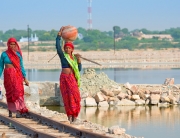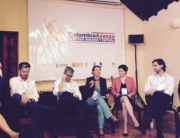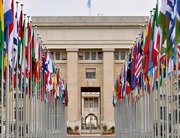Project Description
28 October 2014
Background and Summary of the 2014 World Investment Forum Panel Discussions on Investment and Human Rights. This background and summary description has been compiled and authored by Andrea Saldarriaga and Andrea Shemberg, co-Leads of the LSE Investment & Human Rights Project.*
Background and context
Since 2008 the United Nations Conference on Trade and Development (UNCTAD) World Investment Forum (WIF) has provided an important opportunity for governments, businesses, civil society and academics to build their understanding of the challenges and opportunities that investment can bring to societies. The 2012 forum led to the high-level recognition and endorsement by ministers and Heads of State that investment for sustainable development is a key principle for policy making and investment decisions.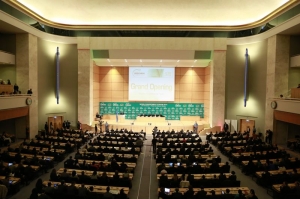
In parallel and separate to the high-level discussions on investment, the UN Human Rights Council unanimously endorsed the UN Guiding Principles on Business and Human Rights (UNGPs) in 2011. The UNGPs call on governments to integrate their duty to protect human rights into investment policy and the work of governmental agencies that facilitate and support investment.
On 15 October 2014, UNCTAD and the Office of the UN High Commissioner for Human Rights (OHCHR) joined efforts to organise – for the first time at the WIF – a set of panel discussions on Investment and Human Rights to bring together the reflections around the role of government policy making in addressing the protection of and respect for human rights in the context of investment. UNCTAD and the OHCHR asked the LSE Investment & Human Rights Project to help design the event and moderate the panels. The panels were designed to explore (1) how investment treaties, investment contracts and domestic policies, laws and regulations can contribute to ensuring investment is carried out in a way that respects and protects human rights; (2) how governments, companies and other actors can better ensure negative impacts on people and the environment are avoided and mitigated in the context of investment; and (3) how to maximise the benefits investment brings to people.
These panel discussions have come at a time when investment rules are increasingly coming on the spotlight. In the past weeks, European newspapers have been reporting on the growing alarm around the negotiations of the TTIP, the trade and investment agreement between the European Union and the United States. Demonstrators across Europe rallied on 11 October on the ‘anti-TTIP day’ to voice their concerns not only over food safety and job security but in particular over investment protection in the form of ISDS – investor state dispute settlement. European voices are joining concerns expressed in other regions including Latin America, Asia and Africa. These concerns are echoed by a growing civil society movement that – in addition to questioning ISDS – has been demanding better and more transparent State investor deals.
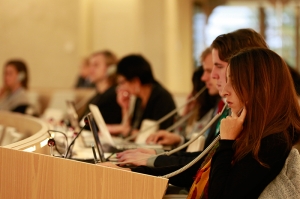 This sudden interest in what used to be viewed as dull and technical economic regulation seems to be based on increased awareness by the general public that decisions around investment actually arrive at their doorstep, affecting their daily lives. Governments also realise that investment – which can serve as a force for good – can also create societal tensions and environmental challenges and might not deliver on its promise of development. Similarly, investors are beginning to understand that implementing investment projects without managing the risks they pose to people and the environment can create financial, legal and reputational risks to their own operations.
This sudden interest in what used to be viewed as dull and technical economic regulation seems to be based on increased awareness by the general public that decisions around investment actually arrive at their doorstep, affecting their daily lives. Governments also realise that investment – which can serve as a force for good – can also create societal tensions and environmental challenges and might not deliver on its promise of development. Similarly, investors are beginning to understand that implementing investment projects without managing the risks they pose to people and the environment can create financial, legal and reputational risks to their own operations.
There is, therefore, a nascent convergence around the idea that in the context of investment there is a missing piece: and this piece is the understanding of how investment rules and legal and economic frameworks can impact the daily lives of people. Building this understanding should help improve our notions about how best to shape international and domestic investment policy that safeguards people and their rights and contributes to an inclusive and sustainable development. The LSE Investment & Human Rights project is working to contribute to enhancing this understanding and to provide innovative approaches and solutions for the integration of human rights concerns in investment policymaking.
Introduction to the panels
The Investment and Human Rights session was opened by Petko Draganov, Deputy Secretary-General of UNCTAD, Mr. Gabriel Duque, Ambassador and Permanent Representative of Colombia to the WTO and Mr. Minelik Alemu Getahun, Ambassador, Permanent Mission of the Federal Democratic Republic of Ethiopia.
Mr. Draganov quoted Eleanor Roosevelt in his statement, reminding the audience that she had said that human rights begins in the “the world of the individual person; the neighborhood he lives in; the school or college he attends; the factory, farm, or office where he works. Such are the places where every man, woman, and child seeks equal justice, equal opportunity, equal dignity without discrimination. Unless these rights have meaning there, they have little meaning anywhere.” Mr. Draganov went on to say that the panel discussions on human rights and investment policy making were designed in this spirit as an important step to better understand how human rights are relevant for investment policies and what that implies for investment policy making. He reminded the audience that both UNCTAD, with the Investment Policy Framework for Sustainable Development (IPFSD), and the OHCHR, with the dissemination of the UN Guiding Principles on Business and Human Rights, were undertaking serious efforts to help integrate concern for human rights into investment policy.
The ambassadors of Colombia and Ethiopia both offered opening remarks indicating the importance of the issue of both human rights and investment in each of their country contexts. Both ambassadors made supportive comments regarding the UNGPs as respective hosts of regional forums for the work of the UN Working Group on Business and Human Rights.
Panel 1 – Practitioner’ experience: the relevance of human rights to investment policy making
The first panel discussion, moderated by Andrea Saldarriaga, explored how – concretely – human rights are relevant in the context of investment. To do so, the panel brought together a prominent group of speakers to share their experiences from their own different areas of practice on how human rights have came up in their work and what challenges they face to integrate human rights concerns when dealing with and regulating investment.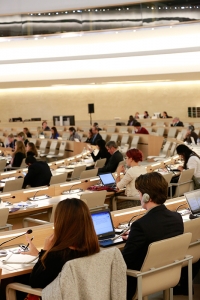
The panel began with the intervention of Niki Kruger, Chief Director of Trade Negotiations at the Department of Trade and Industry in the Republic of South Africa. Ms. Kruger described the experience of her country in identifying the ways in which human rights interact with the regulation of investment, in particular through investment treaties, and the challenges the government faced to adequately integrate its duty to protect human rights in this context. She referred to the arbitration case Piero Foresti, Laura de Carli & Others v. The Republic of South Africa in which international investors challenged the Black Economic Empowerment Act, enacted to address the inequalities created during the apartheid regime. She then described the governmental process that ensued in South Africa to evaluate the impact of investment treaties on domestic regulation in the area of human rights and fashion investment protection through domestic legislation as well as a new model treaty.
Toby Landau QC from Essex Court Chambers and a prominent arbitration practitioner provided a brief explanation of the scope of investment treaties and the functioning of arbitration to resolve investment disputes and explained how human rights have come up in his work as arbitrator and counsel in investor-state arbitration. He then described the challenges that the arbitration practice is currently facing to integrate human rights concerns in that context.
Lorenzo Cotula, a Principal Researcher on Law and Sustainable Development at the International Institute for Environment and Development (IIED) spoke about the need for policy makers to understand how investment policy can impact human rights and sustainable development goals. He highlighted the key role that civil society can play in helping to understand the connections between investment and human rights and in shaping investment policies and regulations that reflect those connections.
Finally, Keith Myers, director of Richmond Energy Partners – a consultancy to oil and gas companies – provided a view from the private sector. Speaking in his personal capacity, he discussed the change in the sector in awareness of the need to manage human rights related risks. He said that while awareness of human rights is growing rapidly in the industry, real commitment and understanding of how to ensure respect for human rights is still patchy. He also expressed that what oil and gas companies need in the context of investment is certainty. Therefore, he said, codes and standards requiring compliance, even in the context of human rights, can sometimes simplify the job of companies because they then know what is expected and can plan for it.
Panel 2 – Examples from practice: integrating human rights into investment policy making
Having discussed the relevance of human rights in the context of investment and the challenges that governments faced to integrate human rights concerns in investment policymaking, the second panel provided an introduction to some of the many concrete efforts that are already underway to integrate a concern for human rights into government investment policy making. This panel was moderated by Andrea Shemberg.
The panel began with the intervention of Elisabeth Tuerk, Chief of International Investment Agreements (IIAs) at UNCTAD, who presented the Investment Policy Framework for Sustainable Development and the opportunities it offers to integrate human rights consideration in investment national policies and regulations as well as in IIAs. She offered some examples of how the IPFSD has been used in practice by governments to guide their efforts in reforming investment rules and by civil society as a benchmark to evaluate the impact of investment policies on sustainable development goals.
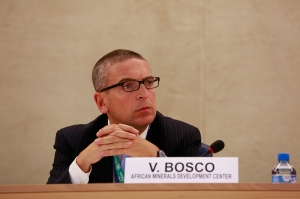 Valerio Bosco, Economic Affairs Officer at the African Minerals Development Centre/UNECA (AMDC), explained the work of the AMDC in implementing the African Mining Vision (AMV). According to Mr. Bosco, the AMV signals a paradigm shift for African countries that are now working to integrate mining into broader socio-economic and planning policies, with a view to promoting its contribution to inclusive growth and structural transformation of African economies. He said that human rights is an important piece of this paradigm shift, and it is being implemented in a number of concrete ways including improving regulations on the environment, health and safety; empowering communities to engage in mining policies and plans; and in thinking about policies to ensure companies respect human rights.
Valerio Bosco, Economic Affairs Officer at the African Minerals Development Centre/UNECA (AMDC), explained the work of the AMDC in implementing the African Mining Vision (AMV). According to Mr. Bosco, the AMV signals a paradigm shift for African countries that are now working to integrate mining into broader socio-economic and planning policies, with a view to promoting its contribution to inclusive growth and structural transformation of African economies. He said that human rights is an important piece of this paradigm shift, and it is being implemented in a number of concrete ways including improving regulations on the environment, health and safety; empowering communities to engage in mining policies and plans; and in thinking about policies to ensure companies respect human rights.
Lene Wendland, Adviser on Business and Human Rights at OHCHR, presented the work of the Office to disseminate the Principles for Responsible Contracts as a tool for government negotiators, parliamentarians, commercial negotiators and civil society to help ensure the integration of human rights risks into the negotiation of State-investor contracts.
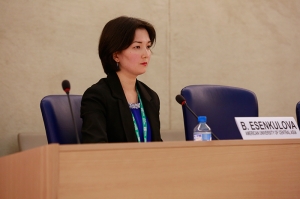 Begaiym Esenkulova, Assistant Professor of the International and Business Law Department, American University of Central Asia, Kyrgyz Republic, shared the practical experience from the recent reforms of the mining sector in the Kyrgyz Republic that integrate human rights considerations. These reforms include open and public auctions for the mining sector; a transparent and open process to observe parliamentary discussion and directly question government officials, including the Prime Minister, about the renegotiation of the Kumtor mine State-investor contract; and legal reforms instituting requirements for mining companies to provide social packages and land recultivation funds.
Begaiym Esenkulova, Assistant Professor of the International and Business Law Department, American University of Central Asia, Kyrgyz Republic, shared the practical experience from the recent reforms of the mining sector in the Kyrgyz Republic that integrate human rights considerations. These reforms include open and public auctions for the mining sector; a transparent and open process to observe parliamentary discussion and directly question government officials, including the Prime Minister, about the renegotiation of the Kumtor mine State-investor contract; and legal reforms instituting requirements for mining companies to provide social packages and land recultivation funds.
Outcome
A lively discussion followed each set of panel presentations. Several questions were aimed at understanding further the human rights risks of investor state dispute settlement, and whether State actions to better protect human rights, such as those described by the second panel, may indeed create a risk of arbitration claims. One clear outcome of the panel discussions is that much more learning and work needs to be done to understand the connections between human rights and investment so that domestic policy and regulation, international investment instruments and dispute resolution mechanisms are both designed to, and trusted by the wider public to, foster the right outcomes for investors and for people.
The LSE Investment & Human Rights Project looks forward to catalysing and logging progress and learning in this area over the next period that can be shared and discussed at the next World Investment Forum.
* The views expressed here do not necessarily represent those of the panelists listed in the article or of the United Nations, UNCTAD, the OHCHR or the LSE. This article should therefore not be quoted or cited as expressing the views of panelists or the institutions mentioned.


